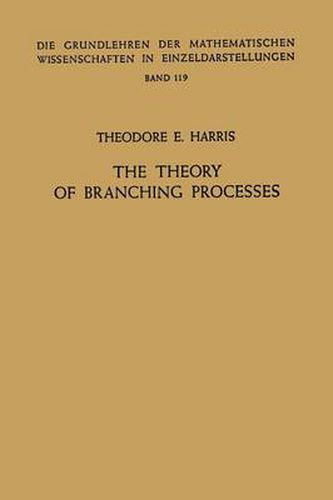Readings Newsletter
Become a Readings Member to make your shopping experience even easier.
Sign in or sign up for free!
You’re not far away from qualifying for FREE standard shipping within Australia
You’ve qualified for FREE standard shipping within Australia
The cart is loading…






This title is printed to order. This book may have been self-published. If so, we cannot guarantee the quality of the content. In the main most books will have gone through the editing process however some may not. We therefore suggest that you be aware of this before ordering this book. If in doubt check either the author or publisher’s details as we are unable to accept any returns unless they are faulty. Please contact us if you have any questions.
It was about ninety years ago that GALTON and WATSON, in treating the problem of the extinction of family names, showed how probability theory could be applied to study the effects of chance on the development of families or populations. They formulated a mathematical model, which was neglected for many years after their original work, but was studied again in isolated papers in the twenties and thirties of this century. During the past fifteen or twenty years, the model and its general izations have been treated extensively, for their mathematical interest and as a theoretical basis for studies of populations of such objects as genes, neutrons, or cosmic rays. The generalizations of the GaIton Wa,tson model to be studied in this book can appropriately be called branching processes; the term has become common since its use in a more restricted sense in a paper by KOLMOGOROV and DMITRIEV in 1947 (see Chapter II). We may think of a branching process as a mathematical representation of the development of a population whose members reproduce and die, subject to laws of chance. The objects may be of different types, depending on their age, energy, position, or other factors. However, they must not interfere with one another. This assump tion, which unifies the mathematical theory, seems justified for some populations of physical particles such as neutrons or cosmic rays, but only under very restricted circumstances for biological populations.
$9.00 standard shipping within Australia
FREE standard shipping within Australia for orders over $100.00
Express & International shipping calculated at checkout
This title is printed to order. This book may have been self-published. If so, we cannot guarantee the quality of the content. In the main most books will have gone through the editing process however some may not. We therefore suggest that you be aware of this before ordering this book. If in doubt check either the author or publisher’s details as we are unable to accept any returns unless they are faulty. Please contact us if you have any questions.
It was about ninety years ago that GALTON and WATSON, in treating the problem of the extinction of family names, showed how probability theory could be applied to study the effects of chance on the development of families or populations. They formulated a mathematical model, which was neglected for many years after their original work, but was studied again in isolated papers in the twenties and thirties of this century. During the past fifteen or twenty years, the model and its general izations have been treated extensively, for their mathematical interest and as a theoretical basis for studies of populations of such objects as genes, neutrons, or cosmic rays. The generalizations of the GaIton Wa,tson model to be studied in this book can appropriately be called branching processes; the term has become common since its use in a more restricted sense in a paper by KOLMOGOROV and DMITRIEV in 1947 (see Chapter II). We may think of a branching process as a mathematical representation of the development of a population whose members reproduce and die, subject to laws of chance. The objects may be of different types, depending on their age, energy, position, or other factors. However, they must not interfere with one another. This assump tion, which unifies the mathematical theory, seems justified for some populations of physical particles such as neutrons or cosmic rays, but only under very restricted circumstances for biological populations.